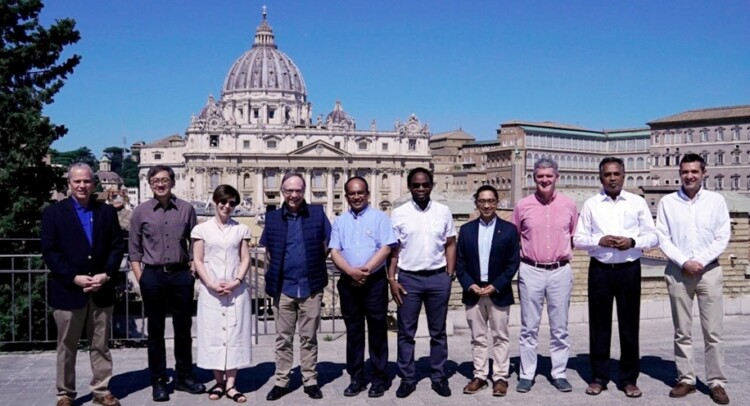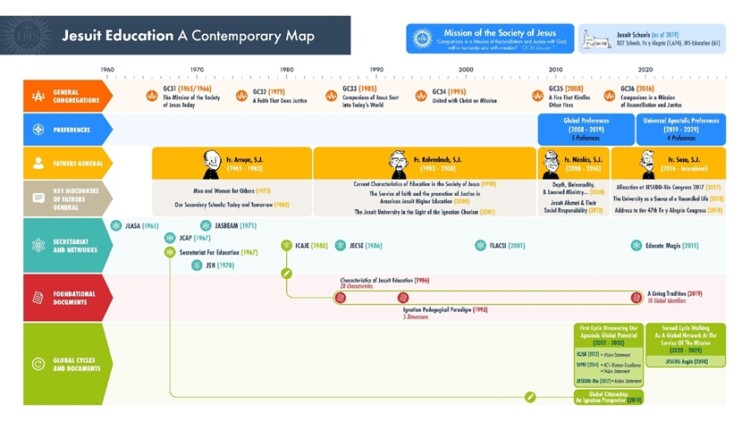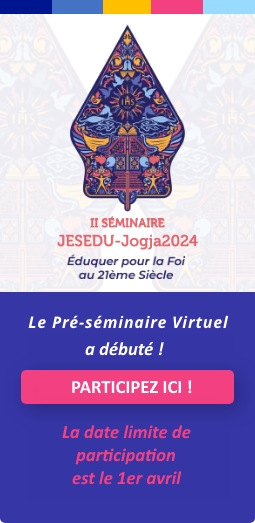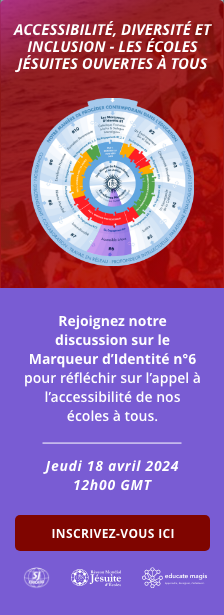Last two years, due to Covid, the International Commission on Jesuit Education (ICAJE) met only virtually. Finally, this year we met face-to-face at Jesuit General Curia in Rome from 16th to 20th of May. The excitement and happiness were visible on the face of every member. Meeting at the Jesuit Curia is an unforgettable experience for all of us. The emerging new challenges at the backdrop of the Pandemic and a highly polarised world where war and violence are seen, our responsibility as educators also increased.
The meeting was well prepared by Jose Mesa with the help of Sunny Jacob and Felipe Carrillo (Secretariat for Education). Catharine from the Secretariat could not come to Rome due to some unavoidable situation.
This meeting, for the first time, found Fe y Alegria and JRS education representatives attending and actively participating in the Global Jesuit Educational deliberations. The highlight of the first day was reporting from the regions. The delegates were requested to highlight in their regional report on the following topics: (1) Impact of the Coronavirus Pandemic in our schools and what future awaits our schools after the pandemic. (2) Colloquium JESEDU-Global2021: what impact is having the region? (3) Implementing our Holistic Education: How are the schools and networks in your region integrating the recent documents and gatherings (UAPs, A Living Tradition, Action Statement JESEDU-Rio2017, Vision Statement JESEDU-Global2021, Human Excellence, IPP. While school heads and teachers around the world showed equally heroic efforts in responding to the pandemic, it was also clear that due to differences in resources, some schools suffered greater disruption than others, leading to more learning deficits and greater social costs among the students. Many regions highlighted the digital-divide that made a big challenge for the schools to run the classes seamlessly. This was particularly true for Jesuit Refugee Service and Fe y Alegria.

The group also discussed the impact of last year’s fully virtual II Colloquium JESEDU-Global2021, which was successfully organised by Asia Pacific. They agreed that more could be done in the different regions, especially in relation to what many regarded as the heart of the colloquium–the Discernment Circles, where in small mixed groups, educators shared and prayerfully listened to one another’s experiences and insights in light of the themes of the colloquium. The Discernment Circles provided the participants with a concrete and powerful experience of the global network. The Global Colloquium was an important event organised by the Global Jesuit Education.
Another topic of discussion was the implementation of the integrated holistic perspective on Jesuit education. [You can find more on it on www.educatemagis.org)]. The delegates shared ideas on how to improve their efforts in continuing the discernment of Jesuit education as a living tradition using the most recent and essential documents of the Society on its education ministry. The global webinar series is one concrete programme, and after the first on Justice last March, the second one on the Care for Our Common Home will be on 9th of June 2022.

(https://www.educatemagis.org/interactive-timeline/)
The delegates had the benefit of listening to two experts who provoked them into a deeper conversation about our schools’ Catholic identity and their contemporary task of faith formation. Fr Benoit Malvaux SJ explained the Canonical implications of the recent Instruction of the Congregation for Catholic Education on “The Identity of the Catholic School for a Culture of Dialogue”. “The witness of Catholic educational institutions shows on their part a great responsiveness to the diversity of socio-cultural situations and readiness to adopt new teaching methods, while remaining faithful to their own identity”, says the document..
Meanwhile, Fr James Hanvey SJ, the Society’s Secretary for the Service of Faith, provided his reflections and questions to frame the group’s conversation on the upcoming II Seminar JESEDU-Jogja2024, which will tackle the important challenge of how to offer faith formation to our students in an in-depth manner, while promoting interreligious respect and dialogue. The Task Force on Faith Formation is already working on this important topic.
A central piece of the meeting was the spiritual conversations on the Catholic identity of our schools, facilitated by Fr John Ravi SJ. There were very good discussion and sharing on the document. There was also discussion on the upcoming global celebration of the 50th anniversary of Fr Pedro Arrupe’s revolutionary talk on “Men (and Women) for Others”. We decided to make it as the Global Peak for 2023. The modalities will be worked out in due course.
New ventures of the Catholic Education the Planet Fraternity & New Global Compact OJEC, were shared with us by Herve LECOMTE (OIEC Mission Officer) and Br. Antonio Ojeda Ortiz, FSC (member of the Congregation for Education of the Vatican). Both the presentations were very helpful for global networking for educators.
Educate Magis is the Global Online Community of Jesuit educators. Eamonn McGuiness presented the programmes and projects of the Educate Magis in a very simple way. Introduction of the presentation was based on two short videos. (Available on www.educatemagis.org). He presented the new creative Doodly video which explains how members can get involved in Educate Magis. Indeed Educate Magis is the platform of Jesuit Education with several global courses for Jesuit school faculty.
As per their custom, the closing Eucharist was held in the chapel in the Rooms of St Ignatius at the Church of the Gesú. The Mass presider, Fr Joe Arimoso SJ, interpreted the significance of the ICAJE tradition as similar to the act of foot soldiers pledging their allegiance to their general. Representing our global network of schools, the delegates gathered in Rome to report on their regions, to discuss possible strategies, and finally, to pledge their allegiance to St Ignatius and to the Society of Jesus.
It would be an understatement to say that a lot was accomplished in those four days, but one important realisation of the delegates is that 10 years after the very first colloquium in Boston, the Jesuit Global Network of Schools (JGNS)–only recently officially launched by Fr General Arturo Sosa SJ–is finally coming of age.
In the words of the Worldwide Secretary for Secondary and Pre-Secondary Education, Fr Jose Alberto Mesa SJ: “We are now beginning to work together and to think of working together as a global network.” Yes, we are a global network of schools, discerning together for a better world.
At this juncture we echo the words of Arturo Sosa, S.J., the superior general of the Society of Jesus; “We Jesuits are people of hope; we believe another world is possible,”. Education is the best means to it.
Se connecter ou Adhérer
pour créer et afficher des commentaires

